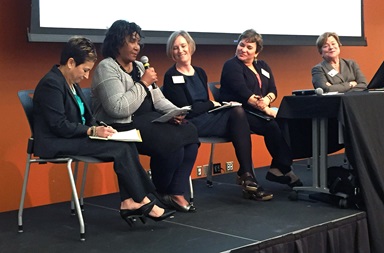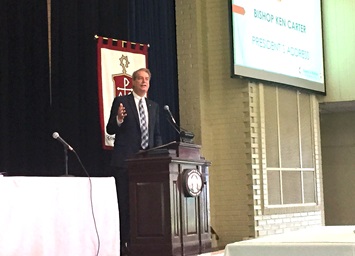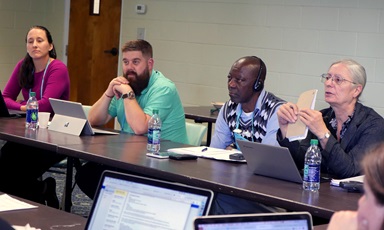
Over the past two years, bishops have debated, reflected and fervently prayed about the future of The United Methodist Church.
Now, they know that the task of finding a way through the denomination’s dispute over homosexuality is in the hands of General Conference delegates.
Bishops have no vote at General Conference. However, they still have a role to play as presiders during the plenary sessions of the denomination’s top lawmaking assembly. During their Nov. 4-7 meeting at Epworth by the Sea, the bishops discussed that work.
They also committed themselves to “trust this General Conference, under the guidance of the Holy Spirit, to discern God’s best way for our future.”
Bishops Cynthia Fierro Harvey of the Louisiana Conference and Sue Haupert-Johnson of the North Georgia Conference presented the statement that the bishops unanimously affirmed.
In the statement, the bishops declared they can best serve the delegates by:
- Presiding fairly and creating a holy atmosphere in which they can do their best work
- Trusting that the General Conference will invoke the Holy Spirit
- Being a prayerful, hopeful, and pastoral presence
- Giving them confidence that we are acting transparently and not orchestrating or manipulating the process toward a desired end, and
- Acting as midwives as they birth something new.
The Council of Bishops has called a special General Conference for Feb. 23-26, 2019, in St. Louis.
The delegates will consider a report by the bishop-appointed Commission on a Way Forward, which includes three different plans for the denomination’s future, as well as any other legislation deemed in harmony with the bishops’ call.
Building trust will be a challenge before the multinational and multilingual legislative body. Delegates to recent General Conference sessions have dealt with distrust in technology, in bishops and in each other. In 2016, the delegates took three days to decide their rules of organization.
Most of the same 864 delegates will be back for the 2019 special session, and they will start with the rules already approved.
“A major responsibility of the Council of Bishops is to make sure we create the kind of space for trust in order to enable the delegates to do their work,” said Bishop John K. Yambasu of the Sierra Leone Conference.
In August, 23 bishops volunteered to undergo training to be presiding officers at the special session. That means mastering the General Conference rules, parliamentary procedure and the electronic queuing system used by delegates who want to address the body.
During their November meeting, the bishops began training. They will continue to have training sessions at least once each month leading up to the special session. They are working with a professional parliamentarian in their preparations.
The entire gathering will require only five or six different presiding officers, the New York Conference's Bishop Thomas J. Bickerton told his fellow bishops. Bickerton represents the bishops on the Commission on General Conference, the group that plans the big meeting.
Deciding which bishops actually end up presiding is the job of the General Conference Committee on Presiding Officers. The committee has 12 members, one from each of the five U.S. jurisdictions and seven multinational central conferences. Half are clergy, and half are laity.
“We’re trying to build a team among the 23 so that we can work together to build a common sense of purpose and a common way of presiding,” Bickerton said. “How can we corporately deal with disruptions, for example? How can we corporately deal with ruling on questions of what’s in harmony? These are the conversations we’re having.”
General Conference delegates from around the globe will only have three days to complete their legislative work. The first day — when people arrive from around the globe and possibly deal with travel delays — delegates will spend largely in prayer.
The next day, Sunday, Feb. 24, with bishops presiding, delegates will seek to determine which of the multiple plans the majority wants to refine.
On Monday, Feb. 25, all delegates will meet in a single legislative committee to do that refining work and vote on all legislative petitions. This is to fulfill the denominational policy that all petitions receive a vote in legislative committees.
The plan is for delegates to elect the chair of the committee from a pool of delegates who already have been trained and served as committee chairs in 2016.
The delegates will return to plenary on Tuesday, Feb. 26 for final voting. Again, bishops will preside.
“As a body, we bishops want the delegates to have the opportunity to do their best work,” said Bishop L. Jonathan Holston of the South Carolina Conference.
Hahn is a multimedia news reporter for United Methodist News Service. Contact her at (615) 742-5470 or [email protected]. To read more United Methodist news, subscribe to the free Daily or Weekly Digests.
Like what you're reading? Support the ministry of UM News! Your support ensures the latest denominational news, dynamic stories and informative articles will continue to connect our global community. Make a tax-deductible donation at ResourceUMC.org/GiveUMCom.



